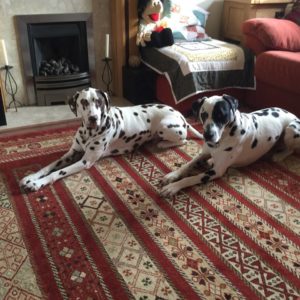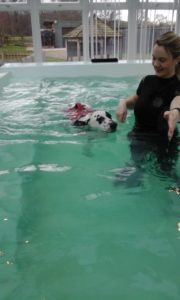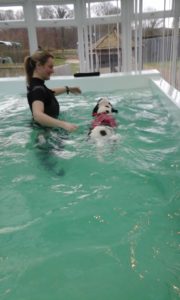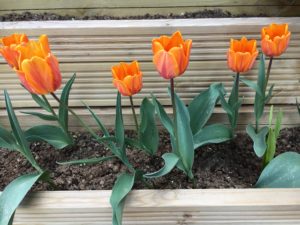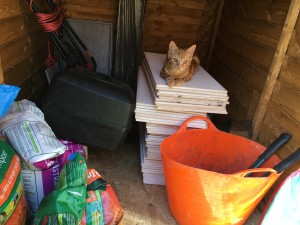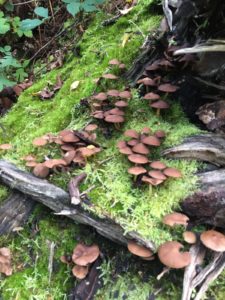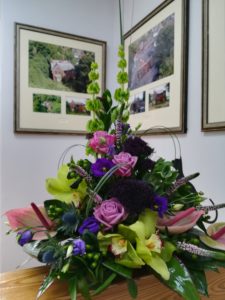Billy is a beautiful Dalmation whom we have been managing for chronic pain for a number of years. Below is a little bit about his journey from his very dedicated and loving owner including some information from us about Billy’s orthopaedic problems.
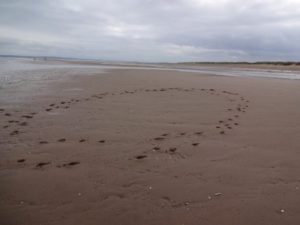 “In September 2013 I took my boys to the seaside; they ran, chased, jumped, wrestled, Patchy went into the sea, Billy barked at the waves. We had a wonderful day and they left nothing behind but their pawprints . The following day Billy was lame. He continued to have his daily walks of about an hour, playing with other dogs and my grandchildren, but his condition gradually deteriorated and he was diagnosed with lumbar sacral disease”
“In September 2013 I took my boys to the seaside; they ran, chased, jumped, wrestled, Patchy went into the sea, Billy barked at the waves. We had a wonderful day and they left nothing behind but their pawprints . The following day Billy was lame. He continued to have his daily walks of about an hour, playing with other dogs and my grandchildren, but his condition gradually deteriorated and he was diagnosed with lumbar sacral disease”
We had always thought Billy was painful in his hip joints and he had responded well to analgesia in the early days. However, after deterioration we opted to send Billy for further imaging at Liverpool Small Animal Teaching Hospital (SATH) which confirmed that his pain stemmed from Lumbosacral degeneration.
An animal’s spine is made up of different types of veterbrae and towards the back of the spine the lumbar vertebra and sacrum make up the lumbosacral region. The spinal cord runs down through the vertebra and lots of important nerves branch off in this region. Over time the lumbosacral vertebra can degenerate ultimately leading to narrowing (stenosis) of the space in between the bones. Eventually this narrowing can cause pinching of the sensitive nerves and put pressure on the spinal cord.
“By December 2017 Billy was walking for only 5-10 minutes two or three times a day and was having four different types of pain relief. He was a sad boy. He was later diagnosed with slipped discs in addition to his lumbosacral disease.”
Later on in his management Billy deteriorated further, he seemed more wobbly and had began to occasionally drag his hind limbs. We decided it would be worth repeat imaging Billy to see if his lumbosacral degeneration had got worse but also to rule in or out other concurrent issues such as intervertebral disc disease (IVDD) which could cause similar signs. It was important to distinguish between the two as surgery can be an option for some but sadly there isn’t a ‘surgical fix’ for degenerative stenosis.
Billy’s second MRI scan confirmed degenerative lumbosacral stenosis. It was development of this stenosis that was likely affecting the perception of his hindlimbs; explaining the wobbly gait and dragging of his back legs. However, multiple disc protrusions were also noted, some of which showed mild compression on the spinal cord but these were thought to be less of a significance. To help with his management Billy was referred internally to the Neurology team at SATH.
“Following an appointment with a Neurological Vet at SATH in December 2017 his medication was reduced and in January 2018 he started hydrotherapy. He has had 7 sessions so far. Billy had never swam before, he did not like water. The first two sessions were about getting him used to being in the water – he now swims freely and is getting good exercise in the water.”
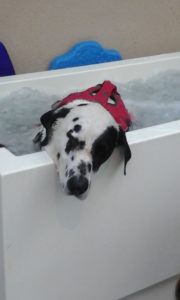 “He is a much happier boy, he is more active, he initiates play with Patchy, he wants to go for longer walks, he wants to play with my grandchildren. He still gets tired after about 15 minutes, but the physiotherapist at SATH recommends building up slowly to regular walks of about 45 minutes. He is on one main medication three times a day now and about 2 hours after his midday tablets he is barking at me to get his toys out! So I am happier too. Oh and he loves the hot tub part of his hydrotherapy.”
“He is a much happier boy, he is more active, he initiates play with Patchy, he wants to go for longer walks, he wants to play with my grandchildren. He still gets tired after about 15 minutes, but the physiotherapist at SATH recommends building up slowly to regular walks of about 45 minutes. He is on one main medication three times a day now and about 2 hours after his midday tablets he is barking at me to get his toys out! So I am happier too. Oh and he loves the hot tub part of his hydrotherapy.”
We last saw Billy a few weeks ago and we agree he has a much better hind limb gait since starting his physiotherapy and hydrotherapy. It’s so nice to see how he enjoys his sessions too-we are a little jealous of the warm whirl pool afterwards!
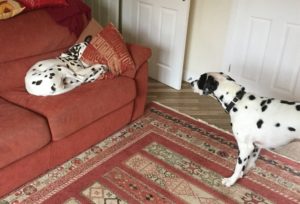 Billy’s owner most recently reports that he has improved by leaps and bounds and she is having to monitor how boisterous and playful he is with Patch and her grandchildren; sometimes even Patch has had too much!
Billy’s owner most recently reports that he has improved by leaps and bounds and she is having to monitor how boisterous and playful he is with Patch and her grandchildren; sometimes even Patch has had too much!
He is down to fortnightly hydrotherapy now and managing 45 minute walks a couple of times a week which is a huge improvement from where he was a few months ago. We are delighted with his progress!

